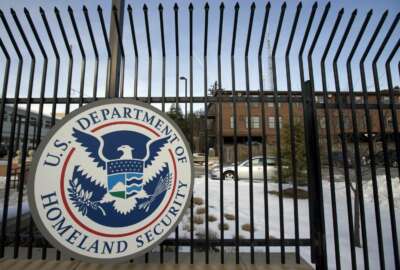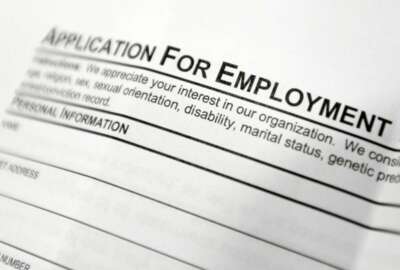
Let’s face it – Congress has more to chew than it can digest
Now that it's been on the street for more than a week, the Biden administration's proposed budget for Fiscal 2022 is about to have its hearings in Congress.
Best listening experience is on Chrome, Firefox or Safari. Subscribe to Federal Drive’s daily audio interviews on Apple Podcasts or PodcastOne.
Now that it’s been on the street for more than a week, the Biden administration’s proposed budget for Fiscal 2022 is about to have its hearings in Congress. For this and what else is ahead, Federal Drive with Tom Temin turned to WTOP Capitol Hill correspondent, Mitchell Miller.
Interview transcript:
Tom Temin: And I guess it’s fairly easy, Mitchell, to predict how the various sides will react to this really blowout budget, at least on the civilian side. But what can we expect in this coming week?
Mitchell Miller: Right, certainly a lot to pour over in that $6 trillion budget. It really is a blowout budget, absolutely massive, even by federal budget standards, would increase spending in a wide range of areas, including public health, education, housing, the environment.
As you alluded to, Democrats are pretty much on board with all of the proposals that the White House is putting out. We really know where Republicans stand House Minority Leader Kevin McCarthy, calling it the most reckless and irresponsible budget proposal in his lifetime. So we’re going to get ready for those partisan battles. The House Budget Committee will start all of this off this week, taking a look at all of these proposals, obviously sprawling amounts of money going out. One of them of course included related to federal workers is that proposed 2.7% pay raise up from the 1% pay increase that federal employees received for this year. Virginia congressman Gerry Connolly is again proposing a higher pay raise under the Fair act as he has in the past. We’ll see what happens with that, although it usually goes to the wayside. The increase in 2020 was bumped as federal workers Remember to 3.1, so we’re basically in that general area. And then there’s a lot of talk about what’s going to happen at these federal agencies in terms of hiring. And there’s a lot of discussion in this budget about really expanding the hiring and many of the agencies including HUD would get close to 10% increase in hiring, more than 7% at EPA. State Department, interestingly, which was retrenched under the former Trump administration, would also get a big increase, probably close to what it would be in the past decade. And then at the IRS, which there’s been a lot of discussion, as you know, in connection with trying to recoup more money as we talk about infrastructure, they are considering with Treasury being able to hire up to 8500 more workers. The head of the IRS says if they were able to hire a lot more workers, and to improve it and improve a lot of different areas, that they would actually be able to bring in hundreds of billions of dollars in additional money that is going to desperately needed if anything close to this budget is able to get through Congress.
Tom Temin: Now this has to be vetted, not just with the appropriations committees, but all of the different oversight committees that have some say in the budgets of their various respective agencies.
So this is not something they can do in a week or even a month probably, it would seem
Mitchell Miller: Right, everything is really going to start rolling into action, starting this week with the senate coming back. House is having some hearings; they will formally be back for votes the following week. But we’re really starting into that process. And some lawmakers feel like things have not moved as quickly as they need to be at this point, that they really need to get rolling. One of them, of course, is the infrastructure issue. The house Transportation and Infrastructure Committee plans to begin marking up its legislation on Wednesday. Late last week on Friday, they unveiled a $547 billion proposal. And that is actually, just as one microcosm of the issues that they’re going to have to deal with, that one differs greatly from the more than $300 billion measure that was passed out of committee from the Senate Environment and Public Works Committee. So there’s just one example of the reconciliation that will have to take place between both chambers as Democrats again, pushing to go big, as they keep saying with a lot of spending. And a lot of Democrats on the more centrist and moderate side saying wait a second, I don’t know if we can afford all of this. And of course, Republicans really pushing back on a lot of these costs.
Tom Temin: And getting back to that infrastructure negotiation,
What is the significance of the president negotiating with Senator Capito, West Virginia? Why that Senator?
Mitchell Miller: Well, West Virginia, Senator Shelley Moore Capito has been somebody who Senate Minority Leader Mitch McConnell has basically entrusted to go ahead with the lead on these negotiations. And she has seen as basically an honest broker here on the hill, that she’s relatively low key. She is someone who works well, with both sides of the aisle. McConnell has really not wanted to get involved in a lot of the deeper things in the weeds on this. So he has said, I’m going to have you be the lead on this. And then she’s a member of a larger group of bipartisan lawmakers of about 20 from the Democratic and Republican side, where Democrats say basically that they can trust her. But obviously, a huge amount of give-and-take has been going on in connection with infrastructure. And there again, when you talked about that timeline, while the administration has tried to downplay various deadlines and specific hard dates, lawmakers really on both sides are saying that this train has to start getting out of the station now, and it’s really going to be something that has to get done in the next couple of weeks because the Senate Majority Leader Chuck Schumer has said he wants to act on the infrastructure measure one way or another, whether it’s with Republicans or not, by July. So obviously, some things have to happen here in the coming weeks with infrastructure.
Tom Temin: We’re speaking with Mitchell Miller, Capitol Hill correspondent for WTOP, and getting back down into the weeds for a moment on telework for federal employees.
This is also something Congress is starting to say, golly, if we pick up the phone, will anyone be there in the agencies?
Mitchell Miller: There’s a lot of concern about what’s going to happen with telework now that we’re sort of coming out of the end of the pandemic here. We’re still obviously in the midst of it. A lot of agencies still struggling with how they’re going to proceed, basically. Are they going to continue to try to expand as many as Congress would like them to do, and then there’s some concerns related to security. The House Oversight Committee has asked that inspectors general from 10 different agencies take a much more closer look at telework and whether or not there are cybersecurity issues that have been raised or have come up during the pandemic. A lot of these agencies as you would expect would be state and Defense Department, Homeland Security, but also Justice Department, Energy, Treasury, Health and Human Services, the VA, Education. So lawmakers want to know, have there been additional problems as we’ve known just in the last few weeks in connection with the meatpacking industry, and with the gas line infrastructure issues, with cyber attacks, and hacking and ransomware. This is really top of mind for a lot of lawmakers right now, a lot of concern related to that and infrastructure issues.
Tom Temin: I was gonna say, yes, the ransomware, of course, is heating up. It’s almost eclipsed talk about what happened on January 6, at the Capitol. And do you see any legislation forming? There’s a lot of talk about ransomware and the effects on the economy. But how do you legislate against Russia? It’s already against the law to do what they’re doing.
Mitchell Miller: Right, and that is going to be a real struggle. And I think a lot of lawmakers are trying to figure out exactly what the federal response can be. Late last week, the FBI Director indicated that it is on par with terrorism. This is something that’s going to probably be picked up, I would say, in the Homeland Security committees. On the House and Senate side, a lot of Republicans have indicated that they would like to delve into this deeper, but it’s such a broad and varied issue that it’s going to be really difficult to actually isolate on this. And then as tech experts have pointed out, some of these ransomware operations, they’re almost like companies. They actually market themselves in this nether world of going after infrastructure in various different countries. So it’s going to be really interesting how that develops over the next few months.
Tom Temin: Almost a tech age version of Murder Incorporated.
And I have to ask you about the Capitol fence because that, again, is a lingering issue related to the January 6 attack on the Capitol. What’s going on there?
Mitchell Miller: Well, it’s really interesting, because this is the one area — one of the few areas I should say — where Democrats and Republicans really do see eye to eye on this issue. Virtually all lawmakers want that fence to come down, but it’s really a matter of timing. I talked about this with D.C. delegate Eleanor Holmes Norton. She’s been one of the most vocal critics, and basically says that this takes away what she effectively views as a park, that Capitol Complex right around the most immediate area. Of course, the earlier, wider perimeter fence was taken down back in March, but this fence still is all around that complex. Eleanor Holmes Norton is pretty optimistic. She thinks that it could come down actually sometime later this summer. But it’s really going to be up to the Capitol Police board, which as you know, a relatively obscure small panel, has come under a lot of scrutiny in the wake of January 6, because they were responsible largely for what was done or not done in connection with security related to what happened during the insurrection. But they actually have the final call on whether or not the fence will come down. Of course the National Guard has all left from here, so the fence is literally and symbolically kind of the last vestige of what you can see in connection with what happened on January 6. Also, I should note that Eleanor Holmes Norton, she had a public roundtable in which she had various experts come in. One of them was a retired army general who took part in the overall review of everything and he said there still needs to be some hardening of the windows, the doors that were damaged during January six before this fence could come down. But I think you’re going to see increasing pressure for this fence to come down in the coming months. And then, meanwhile, they still have to figure out, with the senate coming back this week, what they’re going to do with a nearly $2 billion security measure, which has already passed the House, for a wide range of things, including a retractable fence that would go around the complex. We’ll see what happens with that. Some Republicans have indicated some skepticism about the costs, and indicated they wanted to review it some more. But again, Capitol security is going to be definitely getting a lot of attention in the coming weeks and months.
Tom Temin: Well, maybe doors and windows can come in under the infrastructure bill. Mitchell Miller is Capitol Hill correspondent for WTOP. Thanks so much.
Copyright © 2024 Federal News Network. All rights reserved. This website is not intended for users located within the European Economic Area.
Tom Temin is host of the Federal Drive and has been providing insight on federal technology and management issues for more than 30 years.
Follow @tteminWFED
Related Stories





